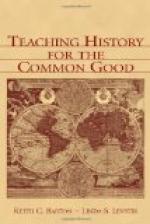Ordinarily, when a class is averaging three or four pages of the text daily, it is an error for the teacher to point out in advance certain dates and statistics that need not be memorized. Such selection should be left to the student. During the recitation the teacher will discover what dates, statistics, and other matter the student has selected as worthy to be memorized, and if correction is necessary it may then be made. It dulls the edge of the pupil’s enthusiasm to be told in advance that some of the text is not worthy to be remembered. Furthermore such instruction does nothing to develop the student’s sense of historical proportion, for it substitutes the judgment of the teacher for that of the pupil.
Advance questions asking explanation of statements made in the text, or by other authors dealing with the same period, insure that the lesson will be read understandingly and that the author’s statements will be carefully analyzed. Such declarations as the following are illustrations of statements whose explanation might profitably be required in advance:—
1. “The Constitution
was extracted by necessity from a reluctant
people.”
2. “Oregon was a make-weight for Texas.”
3. “The greatest
evil of slavery was that it prevented the South
from
accumulating capital.”
4. “The day
that France possesses New Orleans we must marry
ourselves
to the British fleet.”
5. “The cause
of free labor won a substantial triumph in the
Missouri
Compromise.”
6. “The second
war with England was not one of necessity, policy,
or
interest on the part of the Americans; it was rather
one of
party
prejudice and passion.”
The conditions in other countries will add to his comprehension of the facts in the lesson
In so far as the next lesson requires an understanding of the history or conditions of another country, the attention of the class should be directed in advance to such necessity. Special references or brief reports may be advisable. A few well-selected advance questions will send the class to recitation prepared to discuss what otherwise the teacher must explain. A few questions on the character of James II, his ideals of government, the chief causes of the revolution of 1688, and its most important results will do much to explain the colonial resistance to Andros. A few questions designed to bring out the imperative necessity of English resistance to Napoleon will make clear the hostile commercial decrees, impressment, and interference with the rights of neutral ships. Such questions reduce the necessity of explanation by the teacher to a minimum.
His disposition to study intensively will be encouraged




